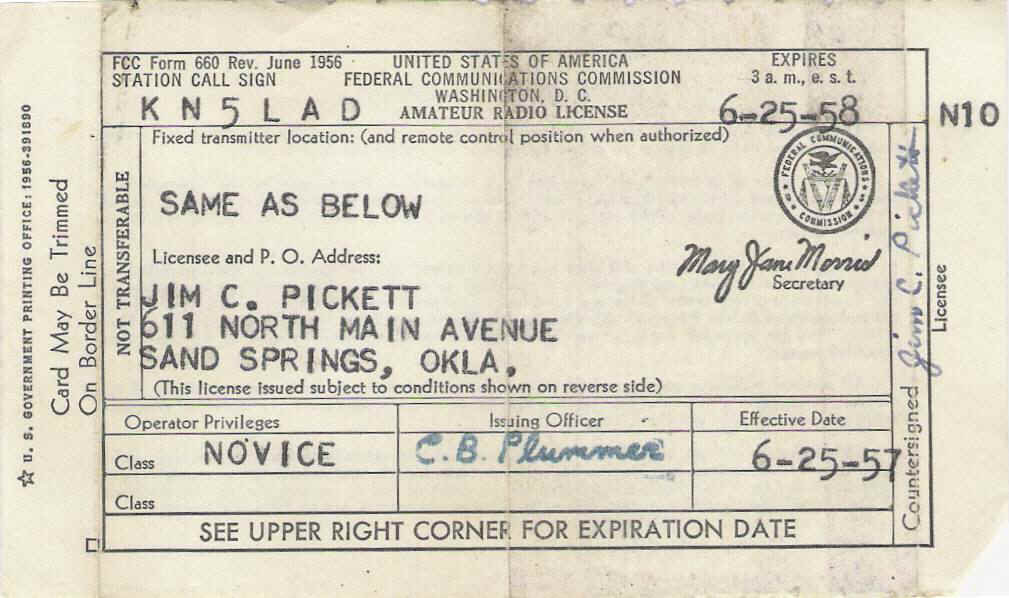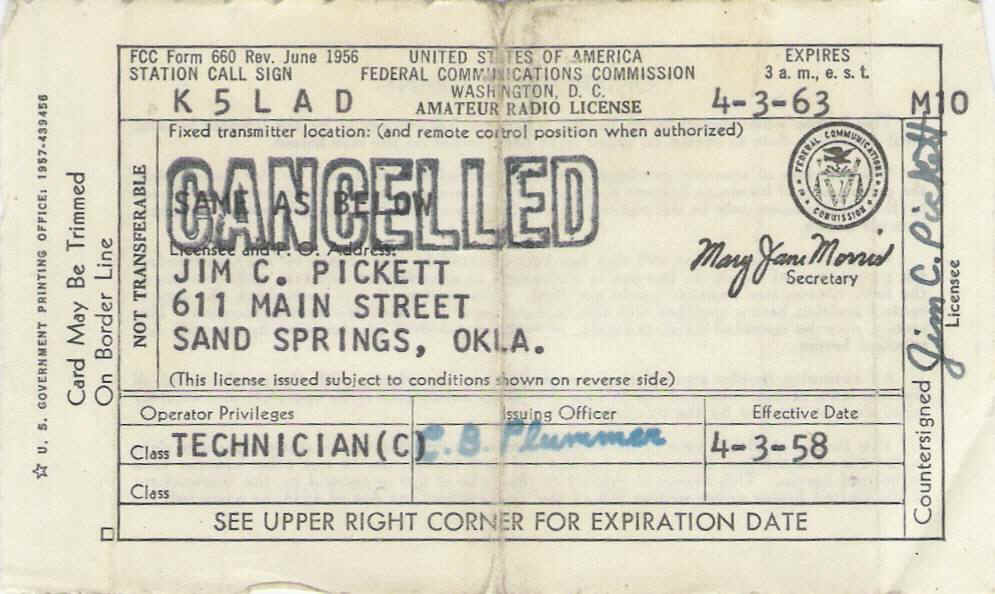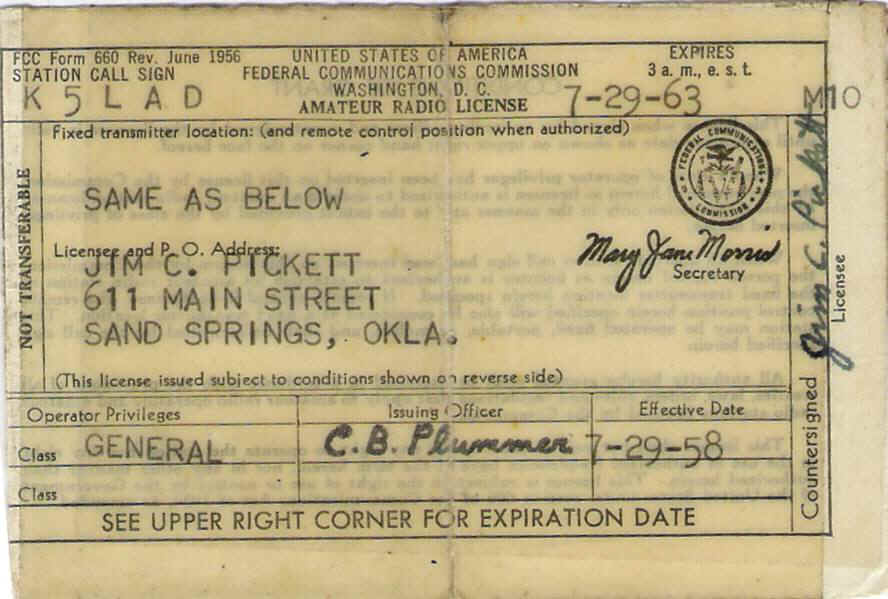K5LAD - 50+ Years of Ham Radio Memories
Volume XI
It's Only Paper but It Sure Made Me Happy
The other day, my wife brought out to my hamshack, a collection of things I had stored away in a "safe place" but had long since forgotten the location. Among those items were some pieces of paper which I treasure. They were the original copies of several of my ham radio licenses which had been stored for sake keeping, only to have become a lost in a forgotten spot.
THE NOVICE LICENSE:
I remember running across my original Novice license several years ago, probably more than ten years, and I was so pleased to find it. Why I didn't immediately find a special display spot for it, I don't know, but it soon disappeared again and I could not find it. I'd tried, on several occasions, to locate it since I knew it was (or had been) around in recent years but my searches were unsuccessful. I was so happy to see them again.
Here is a copy of my original Novice license, issued in June of 1957.

For several years, I've been saying that my license was issued on June 28 so I gained several more days since finding the original paperwork. I consider this document a really special one in my lifetime. Note that the Novice license, back then, only ran for one year and it was NOT renewable. The idea of this level license was to give you a year to bring your code speed from the Novice 5 words per minute up to the 13 word per minute required for the General class license.
THE TECHNICIAN LICENSE:
At this time, there were only four levels of license: Novice (5 WPM), Technician (5 WPM), General (13 WPM), and Amateur Extra (20 WPM). There was no Advanced Class, although in earlier years there had been a Class A license which was the equivalent the the later Advanced Class license. Also, it was legal to possess both a Novice and a Technician ticket simultaneously. The Technician licensee could operate at frequencies beginning at 50MHz (6 Meters) up to nearly X-Ray range. The Technician was assumed to be truly a technician who experimented with the lesser known part of the spectrum and had no desire to rag-chew or work DX on the lower frequencies. The Technician license ran for five years and was renewable. The Technician license test was also taken before a General or Extra class licensee, just as the Novice test had been administered. Typically, the examiner would give you a code test on their code practice oscillator and make sure you could both receive and send code at 5 WPM. If you passed that part, you would apply for the test (Form 610) and it would be mailed directly to the examiner. When they opened the test in front of the examinee and you took the test, they sealed your test back up in the provided envelope and you started the loooooooong wait, often 8 weeks or more. By the way, the examiner was not supposed to look over the test to see how you had done but I know of several cases where they did. Nothing could be changed on the answer sheet but, at least, you knew that you had made it. Among the treasured documents my wife found, my Technician license was among them. The (C) shown after the word TECHNICIAN was to denote that the test was taken "conditionally," i.e. not in front of an FCC examiner but before an upper-level ham ticket licensee.

I received my Technician license before my Novice license had run out so I held them concurrently. Your first thought, when you saw the "CANCELLED" stamped across the face, may have been, "Hey, he really did something wrong and they cancelled his license." Actually, although the Novice and Technician licenses could be held concurrently, the Technician and General licenses could not. When I passed my General class test I was required to turn in the Technician license paperwork for cancellation. Although I may have done something which would warrant the forfeiture of my one of my licenses (probably did), this particular thing does not prove it. When I received my General Class license, the FCC sent back the Technician Class marked "CANCELLED."
THE GENERAL LICENSE:
I was anxious to get that General class license so I could get on "with the big boys." That would open up all of those low bands, or at least most of them, so I could use Phone and not just use CW. As I recall, there were several patches at the lowest end of most of these bands which were available for only Extra class licensees and that was CW only. Since I'd been trying to move up from CW to Phone, I never remember considering an attempt at working toward that Extra ticket. It was only in later years when the FCC removed some operating privileges from the General and gave them to Advanced and Extra class operators that I chose to upgrade my license. I never was one to go for the fanciest house or car, just because it looked better. If my smaller house would keep the rain off my head or my 53 Ford would get me to where I was going, that was good enough for me. It was the same with ham licenses, I had no desire to be "Mr. Top Dog." Now later, when it wasn't just looks but practicality, I upgraded to something higher.

I had mentioned previously that, from the time you passed your General class test until the time you received the actual license, it was often 6 to 8 weeks to wait and sometimes even more than that. The FCC would only come to our general locale on a quarterly basis, i.e., only four times a year. When I took the test in the basement of the old Tulsa Post Office (I wish I could remember the date but that one's lost to history), I had prepared a postcard addressed back to myself, with the message: You have - ____ Passed ____ Failed your General Class license test. There was a place for the FCC Engineer-In-Charge to sign it and, of course, the postage was already included. (BTW - We still called them "Penny Postcards" back then but I think, by that time, they were up to costing three cents or so, unlike the "Penny Postcards" we have now which are 27 cents each) I remember that I had received back that postcard in May or June of that year but until I had the paperwork (above) in hand, it was not legal for me to transmit on those frequencies. The strange coloration of the picture of that license is due to the laminating plastic which I had placed over it. After all, I planned to have that one for a long time.
I noticed that C.B. Plummer was the FCC's Issuing Officer and Mary Jane Morris was the Secretary during all of this time these licenses were issued. I couldn't help myself but I just now got up to look at my current license to see who now held those positions. Alas, neither position was mentioned on the current licenses. I was pretty sure that if they were, C.B. and Mary Jane would no longer be listed.
It's strange, perhaps, that a small handful of papers would bring so much happiness to someone but these papers certainly did that for me. I regret that I don't have any (or very few) photographs of my early-day ham equipment ("we's po") so these papers provide some linkage back to those early and very happy days.
Created September 19, 2007 Updated 05/10/2013
![]() Page visited 818 times Return
to the Home Page
Page visited 818 times Return
to the Home Page